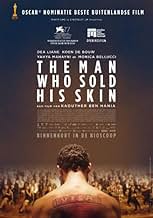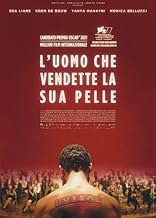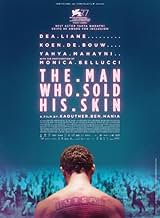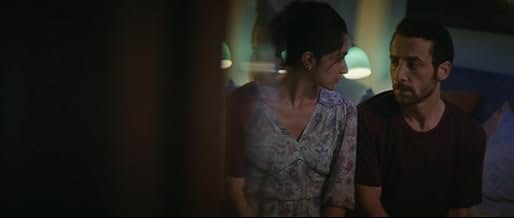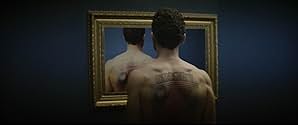The Man Who Sold His Skin
- 2020
- 1h 44m
IMDb RATING
6.9/10
7.5K
YOUR RATING
His own body turned into a living work of art and promptly exhibited in a museum, Sam, a Syrian refugee, will soon realize to have sold away more than just his skin.His own body turned into a living work of art and promptly exhibited in a museum, Sam, a Syrian refugee, will soon realize to have sold away more than just his skin.His own body turned into a living work of art and promptly exhibited in a museum, Sam, a Syrian refugee, will soon realize to have sold away more than just his skin.
- Nominated for 1 Oscar
- 9 wins & 12 nominations total
Koen De Bouw
- Jeffrey Godefroi
- (as Koen de Bouw)
- Director
- Writer
- All cast & crew
- Production, box office & more at IMDbPro
Featured reviews
"The Man Who Sold His Skin" is a visually stunning and thought-provoking film that delves into the themes of identity, personal sacrifice, and the commodification of human life. Through its exploration of the contemporary art world, it raises thought-provoking questions about the boundaries between art and exploitation. With exceptional performances, particularly from Yahya Mahayni as the protagonist, and exquisite cinematography that captures the juxtaposition of beauty and brutality, this film leaves a lasting impact on viewers. It is a captivating and memorable cinematic experience that skillfully combines social commentary, romance, and dark humor to create a unique and thought-provoking narrative. As the story unfolds, the film prompts reflection on the power dynamics at play in society and the sacrifices individuals make for personal freedom. "The Man Who Sold His Skin" is a true standout in its ability to engage, provoke, and resonate long after the credits roll.
"The Man Who Sold His Skin" depicts a refugee forced into an unpleasant predicament. In showing the plight of refugees, Kaouther Ben Hani's Academy Award-nominated movie also looks at the cold attitudes of supposedly highbrow individuals. The sad thing is that there are probably people in real life who have gotten subjected to this sort of thing. I recommend it.
Greetings again from the darkness. Lao Tzu wrote, "Being loved deeply by someone gives you strength, while loving someone gives you courage." But to what extreme would you go for true love, and how far is too far? Writer-director Kaouther Ben Hania offers an early scene on a commuter train as Sam Ali and Abeer flirt and tease to the point that he publically, and loudly, proclaims his love for her. Unfortunately for him, his outburst occurs in Syria, where human rights are always in peril. In fact, this love story is burdened with the weight of human rights, individual choices, and the power of art.
Ms. Ben Hania bookends her film with a choreographed art installation coated in a blizzard of white walls and white gloves. It's 2011, when a distant relative in law enforcement assists Sam Ali (Yahya Mahayni) with his (quite creative) escape from Syria to Lebanon - after a painful slap of reality accompanies Sam's goodbye to his beloved Abeer (Dea Liane in her first screen credit). As Sam flees for his life, Abeer is pressured by her family into an arranged marriage.
We then flash forward one year to find Sam working in a Beirut chicken factory. He scrounges for food at the buffet of local art galleries until one day he is spotted by Soraya (a blond Monica Bellucci), the agent for acclaimed artist Jeffrey Godefroy (Koen De Bouw). When Sam and Godefroy meet, the artist tells him that art is "alive" and, more precisely, "I want your back". A Faustian deal is cut. Godefroy turns Sam Ali into a living piece of art by tattooing his back, and Sam gets the travel visa he desperately needs to reunite with Abeer.
With Sam basically a commodity (there are even T-shirts of his back in the gift shop), there are protests to his being exploited - this despite Sam enjoying the nice hotels, room service, and promise of the visa. Of course, as with any commodity, it's only a matter of time before the almighty dollar comes into play, and soon Sam is auctioned off to a collector. Subtle humor has a role throughout much of the film, and Mr. Mahayni is quite believable as a Syrian refugee sacrificing for love. Ms. Ben Hania's film is inspired by "Tim", an original artwork tattoo by Wim Delvoye sold to a collector in 2008. Mr. Delvoye, a controversial Belgian artist, even makes a brief appearance here as an insurance agent. This is a thought-provoking love story, survival tale, and commentary on the bent side of the art world. When is a man truly free? We don't typically think of Tunisia as a hotbed for cinema, but this film deserves attention.
Ms. Ben Hania bookends her film with a choreographed art installation coated in a blizzard of white walls and white gloves. It's 2011, when a distant relative in law enforcement assists Sam Ali (Yahya Mahayni) with his (quite creative) escape from Syria to Lebanon - after a painful slap of reality accompanies Sam's goodbye to his beloved Abeer (Dea Liane in her first screen credit). As Sam flees for his life, Abeer is pressured by her family into an arranged marriage.
We then flash forward one year to find Sam working in a Beirut chicken factory. He scrounges for food at the buffet of local art galleries until one day he is spotted by Soraya (a blond Monica Bellucci), the agent for acclaimed artist Jeffrey Godefroy (Koen De Bouw). When Sam and Godefroy meet, the artist tells him that art is "alive" and, more precisely, "I want your back". A Faustian deal is cut. Godefroy turns Sam Ali into a living piece of art by tattooing his back, and Sam gets the travel visa he desperately needs to reunite with Abeer.
With Sam basically a commodity (there are even T-shirts of his back in the gift shop), there are protests to his being exploited - this despite Sam enjoying the nice hotels, room service, and promise of the visa. Of course, as with any commodity, it's only a matter of time before the almighty dollar comes into play, and soon Sam is auctioned off to a collector. Subtle humor has a role throughout much of the film, and Mr. Mahayni is quite believable as a Syrian refugee sacrificing for love. Ms. Ben Hania's film is inspired by "Tim", an original artwork tattoo by Wim Delvoye sold to a collector in 2008. Mr. Delvoye, a controversial Belgian artist, even makes a brief appearance here as an insurance agent. This is a thought-provoking love story, survival tale, and commentary on the bent side of the art world. When is a man truly free? We don't typically think of Tunisia as a hotbed for cinema, but this film deserves attention.
A desperate man on the run from Syria, sells his back as a canvas for an eccentric artist. He sits as a display for audiences at galleries and museums. His girlfriend Has moved to Belgium with her new husband. He is well paid but has doubts about his choice. The story uses a real life situation where a man sold his skin to an artist. The movie was nominated for an Oscar and I rank it just below A Better Life in the foreign film category.
The Man Who Sold His Skin is a pretty good movie. And it's one about art that to an extent shares my feelings and opinions of it. Meaning, that I was naturally inclined to like it as soon as I understood what was going on... And I did.
But the movie comes with its own collection of flaws that are a little too big to miss. The greatest complaint I have is that the movie overall seemed aimless. Aimless in that there was no one destination the writers felt comfortable diving deep into. Rather, the movie keeps itself safe on the surface; often finding itself at the door of a sophisticated and thought provoking conflict, but hesitates entering or engaging with those questions. Another minor complaint is the ending; which after all what the movie has been about, felt a little too cheesy.
Overall, I like what the movie is about, and I'm glad I watched it. The complaints I have are not too great to prevent one from enjoying the movie.
But the movie comes with its own collection of flaws that are a little too big to miss. The greatest complaint I have is that the movie overall seemed aimless. Aimless in that there was no one destination the writers felt comfortable diving deep into. Rather, the movie keeps itself safe on the surface; often finding itself at the door of a sophisticated and thought provoking conflict, but hesitates entering or engaging with those questions. Another minor complaint is the ending; which after all what the movie has been about, felt a little too cheesy.
Overall, I like what the movie is about, and I'm glad I watched it. The complaints I have are not too great to prevent one from enjoying the movie.
Did you know
- TriviaWhile director Kaouther Ben Hania was visiting the Louvre Museum in Paris in 2012, there was a retrospective of Belgian artist Wim Delvoye. There she saw, in Napoleon III's apartments, Delvoye's Tim (2006 - 08), in which the artist had tattooed the back of Tim Steiner, who was sitting on an armchair with his shirt off displaying Delvoye's design. The piece was sold to a German art collector and Tim is contractually obliged to spend a certain amount of time, topless and sitting still, in a gallery every year. Wim Delvoye appears in the movie as the insurance guy.
- GoofsWhen Sam Ali changes his seat at the train at 05:55, the place of the man in the back seat changes each time the camera switches between Sam and Abeer.
- ConnectionsFeatured in The Oscars (2021)
- SoundtracksFiliae maestae Jerusalem, RV 638: I, 'Filiae maestae Jerusalem'
Music by Antonio Vivaldi (uncredited)
Conducted and Performed by Philippe Jaroussky (Audio) (p)
Performed by Ensemble Artaserse (uncredited)
2014 Erato/Warner Classics, Warner Music UK Ltd.
- How long is The Man Who Sold His Skin?Powered by Alexa
Details
- Release date
- Countries of origin
- Official sites
- Languages
- Also known as
- El hombre que vendió su piel
- Filming locations
- Production companies
- See more company credits at IMDbPro
Box office
- Budget
- €2,230,000 (estimated)
- Gross worldwide
- $227,290
- Runtime
- 1h 44m(104 min)
- Color
- Sound mix
- Aspect ratio
- 2.39 : 1
Contribute to this page
Suggest an edit or add missing content


